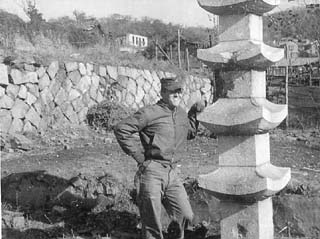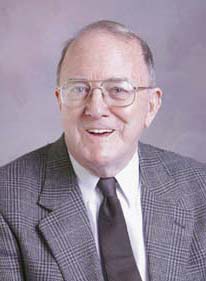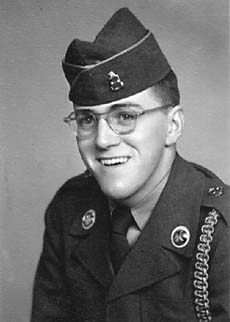
“You’ve got mail.” That phrase may be a bit grammatically incorrect but for a soldier who is stationed overseas those words – whether on a computer screen or via land mail – are some of the most important and uplifting ones that could be heard at the end of the day. With today’s technology, soldiers who are stationed in such far-flung locations as Iraq, e-mail is a great way to stay in touch with loved ones. Back in the era of the Korean War, mail call was the highlight of the day, according to Army veteran David Lavery. Lavery enlisted in 1952 after he graduated high school. “There really wasn’t much work so my friend and I joined,” he said, adding that the Army promised they would never go to Korea. “Six months later we were shipped over.” Lavery, who was 20 at the time, served 17 months in Korea. “I was involved in Operation Little Switch which was the unit that participated in releasing prisoners,” he said. “The United States released about 3,000 prisoners and we only received 500 of our guys back.” He saw many things while he was overseas that “made the hair on the back of my neck stand up,” he said. The time he spent in Korea is a time he will never forget. “From the poverty to the devastation of war, it’s something that will stay with me forever,” he said. One of the things Lavery remembers most about his time there was mail call. “Every day at 5 p.m. we’d gather and wait to see if we received something from home,” he said. “If one of the guys from your unit, or one of your friends wasn’t there you picked up their mail and took it back to their bunk for them.” Lavery joked that when they called a name that even sounded remotely like his last name he’d raise his hand and go up and get the mail. “It took about five days for the copy of Sporting News my Dad mailed to me to arrive,” he said. “My mother used to write the most and she gathered up comments from everyone else and wrote them in her letter.” For servicemen, postage home was free. “All we had to do was write ‘free’ where the stamp would normally go,” he said. Writing a letter home every day wasn’t unusual, he said. “We didn’t really have anything to do at night so we would go back to our bunks and write letters,” he said. “When I look back at the letters I sent home I laugh… a 20-year-old really doesn’t have enough to say to write home every day.” Sometimes a solider could go weeks with out a letter from home and then all the mail would come in a big batch, he said. “We didn’t have ball point pens back then either, we used ‘regular’ ink,” he said. “Sometimes the letters got messy.” One of the bad parts of receiving mail, however, Lavery said was when someone received a “Dear John” letter. “I was dating a girl from back home before I left and she broke up with me while I was in Korea,” he said.” It’s hard to get those letters but it seemed like everyone got them so we formed a ‘Dear John’ club and we’d get together and commiserate with the guy who received one.” Lavery’s unit was stationed two to three miles behind the combat lines. “It was scary,” he said. “Sometimes the Chinese would break through the lines.” In 1989, Lavery and several other Korean War veterans made the trip back to Korea. “I was amazed at how much the country had recovered,” he said. The older Koreans remembered the soldiers, Lavery said. “They bowed at the bus when we came to town and the little children would just come up to us and touch our clothes,” he said. “I think in their way it was a way of touching the past and saying thank you.” Following his three years in the service, Lavery came back home to the Rochester area, started a family and began working as a civilian. One of the jobs he had since his stint in Korea is the one he presently holds as an advertising representative with Westside News Inc. “I knew Keith (Ryan, publisher) and he asked if I wanted to come and help out as a salesman ‘for a while’,” Lavery said. “I’ve been here 15 years.” He married Mary Jane in 1964. They had a daughter, Mary Beth, and a son, John. After 25 years of marriage, Mary Jane passed away. Lavery’s daughter eventually introduced him to the woman who would become his second wife, Charlotte. They married in 1993. Between Dave and Charlotte they have five children and ten grandchildren. |
||||||


